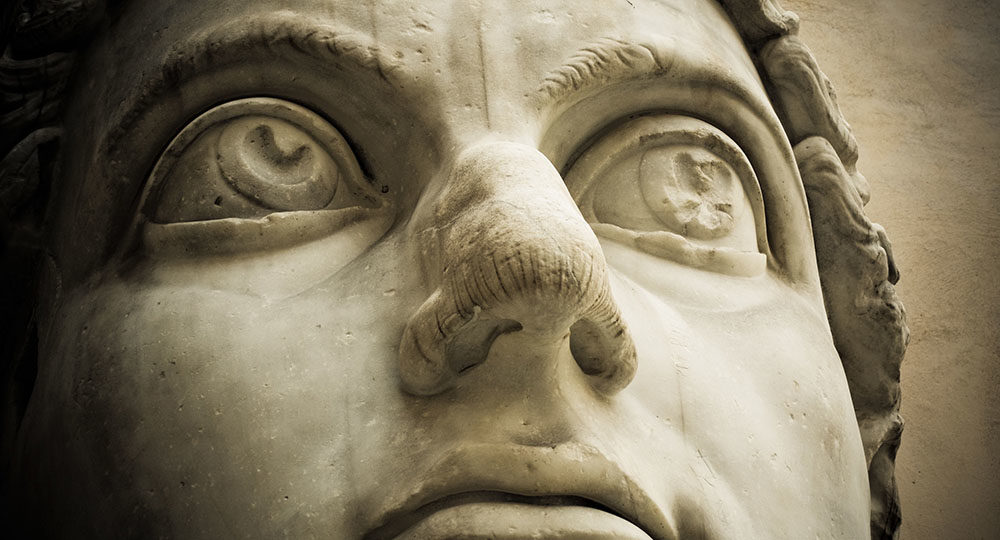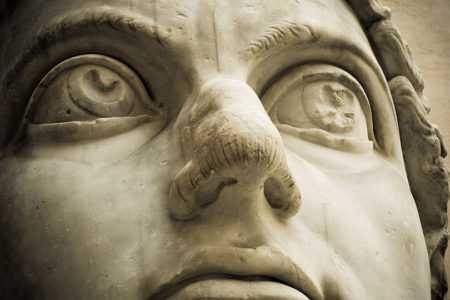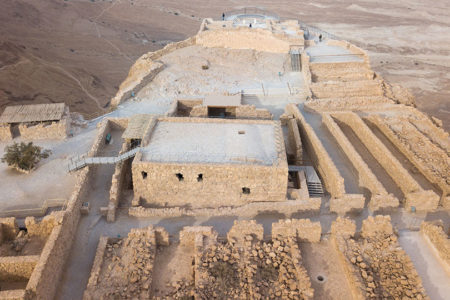The Emperors of Rome vs. The Messiah
Near the end of his life, as the Roman Emperor Domitian was making claims of divinity and persecuting the church, the Apostle John wrote, “the whole world lieth in wickedness” (1 Jn. 5:19b). John was teaching that earthly rulers, who are usually outside the grace of God, serve the purposes of Satan, not only by being ruthless dictators, but also by attempting to thwart the purposes of God and oppress His people. Ancient political history reveals a bloody story of men vying for power through plots, subplots, assassinations, and coups. It was essentially an axiom that any new king would automatically eliminate any possible rival to his throne. Thus, it is not strange that when these rulers were confronted with the possibility of a rival king—the Messiah—their first impulse was to eliminate Him and His followers. This has been the testimony of history ever since the Messiah’s birth, and it will continue to be so until He returns and destroys ungodly rule on the earth. Let’s examine some examples of the conflict as seen in the attempts of the Roman kings and emperors of the first four centuries A.D. to oppress the Messiah and His followers.
Herod the Great: King of Judea (37–4 B.C.)
Herod is well known to Christians as the infamous king who had the babies murdered in Bethlehem (Mt. 2). It is not so well known, however, that this incident, while not recorded in secular history, fits perfectly with Herod’s character as we know it. Herod was not Jewish but Idumean (an Edomite). Thus, he was not born to the kingship, but, through the political intrigues of Rome and with the help of his father Antipater, he was proclaimed king of the Jews by the Roman Senate in 37 B.C. Over the years, Herod became paranoid and began executing many of his own sons and even his beloved wife Mariamme because he feared losing the kingship. Caesar Augustus joked that it was safer to be a pig in Herod’s house than a son.
So, when the magi came along asking, “Where is he that is born King of the Jews?” (Mt. 2:2), Herod’s only thought was to kill this King as quickly as possible. His madness led him to murder the helpless infants of Bethlehem. The Apostle John pictured this scene in Revelation 12:4, as the dragon (Satan) standing before the woman (Israel/Mary) to devour the Messiah, but the dragon did not succeed. At Jesus’ crucifixion it appeared that the dragon had won, but in reality it was his greatest defeat as the Messiah ascended to His throne (Rev. 12:5).
Pontius Pilate: Procurator of Judea and Samaria (26–36 A.D.)
Pontius Pilate was a career military officer whose job it was to keep order over his territory. He apparently worked his way up through the ranks, and this assignment to rule over Judea provided an opportunity to wield power. He had no sensitivity to Judaism and even seemed to try to provoke hostility with the Jews by emphasizing his authority through Rome.
Pilate’s disregard for justice and his desire to secure his own position are most evident in the trial of Jesus. All four Gospels record that Pilate did not see Jesus as a military or political threat to his rule. In fact, he wanted to set Jesus free. But when the Jewish religious leaders threatened to report him to Emperor Tiberius for freeing a rival king (Jn. 19:12), Pilate caved in to their request for Jesus to be crucified, even though he knew it was unjust. Thus, Pilate handed over the true King of the world for political expediency, to safeguard his own position.
Ironically, Pilate later committed suicide when he was called back to Rome to answer charges that he had acted too severely in an incident in Samaria by ordering some religious zealots to be massacred. Although Pilate was not an emperor, he was the Roman authority over a little country that was despised by Rome. There he made decisions based on his own self-interest, and it seemed that no one cared. In so doing, Pilate condemned an innocent man to death in what could arguably be considered the greatest injustice in the history of mankind.
Emperor Nero (54–68 A.D.)
Nero was the first Roman emperor to persecute Christians simply because they were Christians. This was not due to any theological issue, such as emperor worship, but because Nero wanted a scapegoat to punish for a fire that had destroyed the center of Rome. By this time in his reign, however, Nero was a madman.
As the adopted son of Emperor Claudius, he had a family tie to Caesar Augustus through his mother Agrippina and a claim to the throne through marriage to Claudius’ daughter. When Claudius was murdered, Nero became emperor at age 16. The first five years of his reign were peaceful due to the restraining influence of his mother, a trusted administrator, Burrus, and his tutor, the philosopher Seneca. But in 59 A.D. Nero had his mother murdered, and three years later Burrus died. Nero then reigned as the “Son of Apollo.” He fashioned himself as an actor and a charioteer, and all of Rome was subject to his whims.
Nero displayed his madness against the Christians, not just in the fact that he chose them to be the scapegoat for the fire, but in his seeming delight in their torment. As the Roman historian Tacitus relates, the Christians were subjected to public humiliation in their deaths (Annuls xv.44). Some were sown into animal skins and set upon by wild dogs. Many were crucified. But the worst torture was when Nero set Christians on fire around the chariot course then rode his chariot around the course at night by the light of their burning bodies. Church tradition records that the Apostles Peter and Paul were martyred during this time. Paul was beheaded because he was a Roman citizen, while Peter was crucified upside down, seemingly due to his humility in not considering himself worthy to die in the same manner as the Lord had.
Eventually, even the Romans realized that Nero had to be deposed. When Galba made a claim to the title, the praetorian guard withdrew its support from Nero, without which he had no power. Nero committed suicide in 68 A.D.
Emperor Domitian (81–96 A.D.)
Domitian, the younger brother of Emperor Titus (79–81), ruled as an autocrat with an agenda. He wanted to return Rome and the entire empire to its original principles and national pagan religion by suppressing and persecuting anything foreign. To a Roman, not only were the Eastern religions foreign, but so was the monotheism of Judaism and Christianity. For Jews and Christians, this problem was exacerbated by Domitian’s proclaiming himself as “Lord and God” and demanding that all citizens worship the genius of the emperor. Thus, the imperial cult was established as a way to unify the empire.
In doing so, Domitian instituted the first empire-wide persecution of Christianity. It is most probable that the Apostle John was exiled to the island of Patmos during this time, where he received “The Revelation of Jesus Christ” (Rev. 1:1). The Book of the Revelation reveals that the empire-wide persecution by Domitian in John’s day was typical of the ultimate worldwide persecution and demand for worship of the Antichrist. John’s message to his readers was to stand firm in the Lord against this persecution so that they might one day rule in the Kingdom with Christ and live forever in the new Jerusalem. While Domitian was assassinated by his political rivals and Satan and the Antichrist will be cast into the lake of fire, Jesus Christ, the only true King of kings and Lord of lords, will reign forever and ever.
Emperor Diocletian (284–305 A.D.)
By the middle of the third century A.D., Christianity had spread throughout the Roman Empire, from England and Spain in the west to North Africa and Mesopotamia in the east. The Roman emperors during this time began to worry about the Christians’ loyalty to the empire, especially those in the army. In 250 A.D., the Emperor Decius issued an edict that everyone must sacrifice to the gods and the genius of the emperor to show loyalty to the state. Those who sacrificed received a libellus, a document certifying their loyalty to the Roman gods and the state. Those who did not possess such a document could lose their property and possibly their lives.
The Emperor Diocletian intensified these persecutions. Church historian Eusebius (Church History, viii.ii.4, 5) records the following: “It was the nineteenth year of the reign of Diocletian (A.D. 303), and the month of Dystrus, called by the Romans March, in which the festival of our Saviour’s passion was at hand, when the imperial edicts were every where published, to tear down the churches to the foundation, and to destroy the sacred Scriptures by fire, and which commanded, also, that those who were in honourable stations, should be degraded, but those who were freedmen should be deprived of their liberty, if they persevered in their adherence to Christianity.” A later edict decreed the penalty of death on those who did not sacrifice to pagan gods.
Because Diocletian and his Caesar, Galerius, ruled in the eastern half of the empire, the persecution was much more severe there—and that was where the majority of the Christians lived. The persecution was intense; many Christians died, and, sadly, many copies of the Scriptures were burned. But the persecution was short-lived, as Diocletian “retired” in 305. By 311, Galerius, on his deathbed, issued the Edict of Toleration, which allowed Christians to worship free from persecution as long as they promised not to disrupt the peace of the empire. After a civil war among rival emperors, Emperor Constantine issued the Edict of Milan in 313, whereby absolute freedom of religion in the Roman Empire was proscribed. Thus, out of the fires of persecution came the great Christian Byzantine Empire.
Conclusion
As recorded in Acts 4, the apostles had an opportunity to proclaim that Jesus was Lord of all to the Jewish leaders of their day. When the leaders rejected their message, the apostles recalled Psalm 2 (see Acts 4:25–26), which proclaims that when the Lord sets His anointed Messiah on the throne to rule the world in righteousness, the kings of the earth will rage against His rule. Thus, the fact that Jesus is now Lord causes resistance instead of evoking humble worship from the rulers of this world. This has not changed in the 2,000 years since the first century. Because of this resistance, the Lord will “break them with a rod of iron” and “dash them in pieces like a potter’s vessel” (Ps. 2:9).
The Lord has a word of counsel for these earthly rulers. He says, “Be wise now, therefore, O ye kings; be instructed, ye judges of the earth. Serve the Lord with fear, and rejoice with trembling. Kiss the Son, lest he be angry, and ye perish from the way, when his wrath is kindled but a little. Blessed are all they who put their trust in him” (Ps. 2:10–12).
The struggle between the satanically empowered rulers of this world and the Lord Jesus Christ will come to an end when He returns in glory with His angels and His army to end Satan’s rule over the earth (Rev. 19:11–19). The Lord Jesus Christ will then set up a kingdom of righteousness, as promised to the saints from the beginning. It is to this end that we pray, “Thy kingdom come. Thy will be done in earth, as it is in heaven” (Mt. 6:10).







